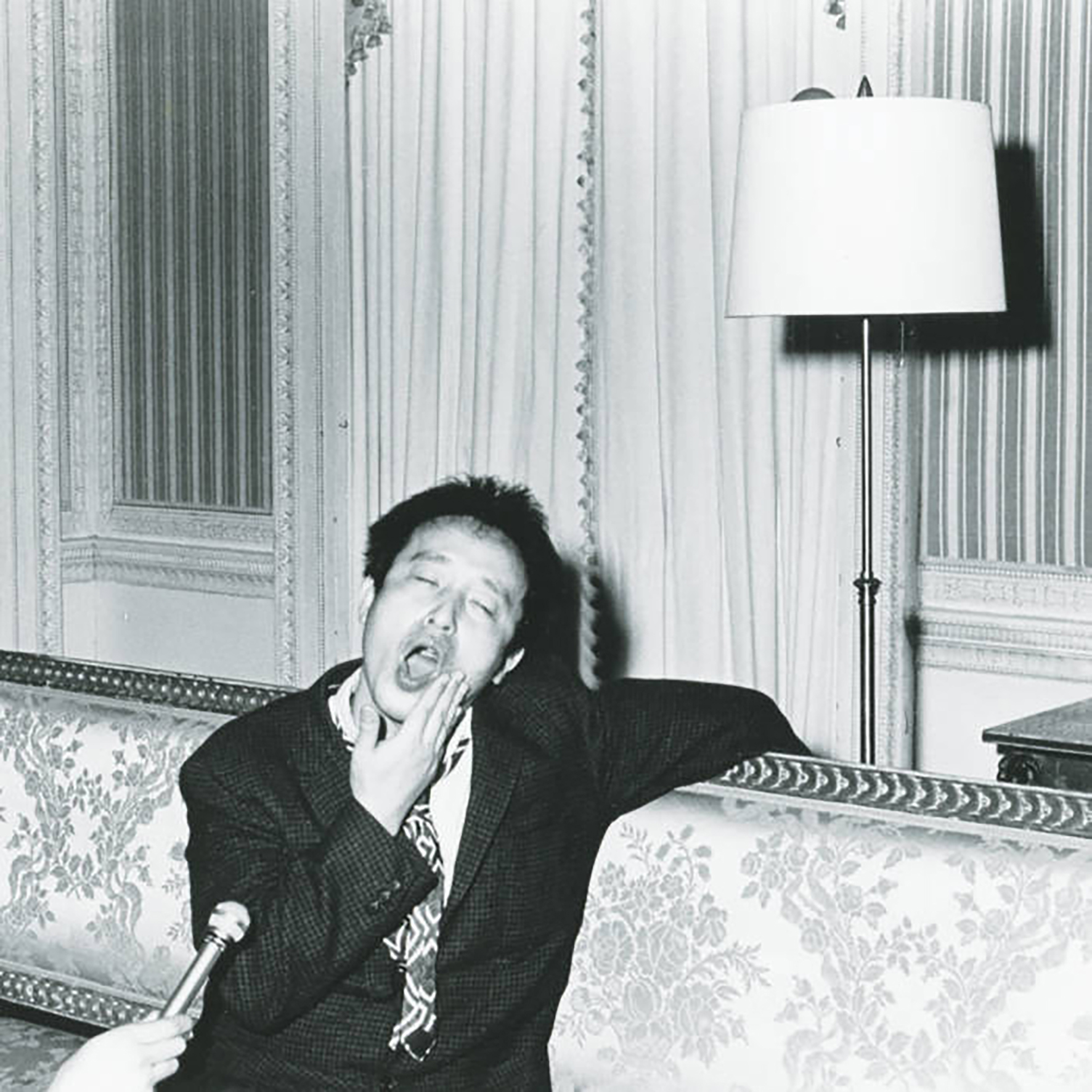Aki Onda, "Nam June's Spirit Was Speaking To Me"
 Explicitly paying homage to a titan of the 20th century avant-garde is always a risky undertaking, as it unavoidably invites daunting expectations and often unflattering comparisons. Occasionally, however, an artist will come up with a suitably ingenious and radical angle and something new emerges that is every bit as intriguing as its original inspiration. Happily, Aki Onda's first release for Recital Program is one of those rare revelations, as it documents a series of "séances" in which Nam June Paik's spirit may or may not have crept into a series of radio transmissions. While I am personally quite skeptical about supernatural matters, enigmatically manipulating and haunting the airwaves from beyond the grave does seem like something Paik would absolutely do if he had the chance. That said, Nam June's Spirit Was Speaking To Me is an endearingly bizarre album regardless of whether or not the spirit world was involved, transforming distortion and interference into hallucinatory noisescapes that feel like the bridge between the darkness of early industrial music and the gleeful experimentalism of the LAFMS.
Explicitly paying homage to a titan of the 20th century avant-garde is always a risky undertaking, as it unavoidably invites daunting expectations and often unflattering comparisons. Occasionally, however, an artist will come up with a suitably ingenious and radical angle and something new emerges that is every bit as intriguing as its original inspiration. Happily, Aki Onda's first release for Recital Program is one of those rare revelations, as it documents a series of "séances" in which Nam June Paik's spirit may or may not have crept into a series of radio transmissions. While I am personally quite skeptical about supernatural matters, enigmatically manipulating and haunting the airwaves from beyond the grave does seem like something Paik would absolutely do if he had the chance. That said, Nam June's Spirit Was Speaking To Me is an endearingly bizarre album regardless of whether or not the spirit world was involved, transforming distortion and interference into hallucinatory noisescapes that feel like the bridge between the darkness of early industrial music and the gleeful experimentalism of the LAFMS.
This project first began to take shape a decade ago, as Onda spent several days at Seoul's Nam June Paik Art Center back in 2010 for a series of performances.One night, while scanning through South Korean radio stations in his hotel room, Onda "stumbled upon what sounded like a submerged voice" and "began to record it in fascination."That first recording is the heart of this album, as the opening "Seoul" stretches out for over 20 minutes, while the remaining three pieces are considerably more modest in scope.According to Onda, all four pieces were recorded from the same radio "with almost no editing, save for some minimal slicing and mastering."If that is indeed true, "Seoul" captures quite a fascinating and otherworldly confluence of overlapping and distorted transmissions.Initially, there is indeed a voice speaking over a sputtering miasma of crackle, hiss, and buried saxophone melody, but the more abstract churning weirdness that follows is far more compelling than the opening.The meat of "Seoul" essentially feels like a manic and obsessively repeating loop that passes through various stages of corrosion and interference as it relentlessly surges forward.In fact, it arguably has the same dynamics as a live noise performance, as its structure is enveloped in climactic cascades of static at various points.While such moments imbue the piece with the illusion of a deliberate arc and an enticing sense that the whole thing could go off the rails at any second, the real beauty of the piece lies in the alien character of the sounds themselves: a rhythmic collision of frog-like chirping, shuffling pulses, and an ascending melodic fragment that seems damned to eternal repetition.Sometimes the veil of static pulls back to fleetingly make one sound especially prominent, but it never stops being an unstoppable juggernaut of submerged bloops and wobbly phantasms.
Onda's next channeling occurred two years later in Germany, documented here by the modestly brief "Köln."Unlike its mercilessly propulsive predecessor, "Köln" feels like seething electromagnetic storm that unexpectedly dissipates to reveal a charismatic Frenchman speaking over a tinkling piano motif.That interlude is very short-lived, however, as it soon gets subsumed by sputtering snatches of a news broadcast before ultimately resolving into a rhythmic outro of scrape-like sounds and hissing static.The following "Lewisberg," recorded two years later, opens with a news broadcast about medical marijuana over an insistent beep.Once the voice disappears, it feels very looping and mechanized, but there is a wonderful fleeting glimpse of something resembling a bittersweet xylophone melody.Overall, however, it mostly feels like a malfunctioning industrial machine that keeps alternately faltering and roaring back to life.Its final minute is especially vivid, as all of the static and the sputtering disruptions unexpectedly vanish to allow the shuddering machine rhythm to unfold in perfect clarity.The album's final piece ("Wroclaw" (2013)) departs from the linear chronological arc of the previous pieces, but it makes for an excellent closing statement.Much like "Lewisberg," it locks into a very machine-like rhythm, but this time the rhythm is centered upon a repeating screech.It is a very cool motif that again recalls a noise performance, as the pitch of the screech sometimes changes and a buzzing bass tone erratically manipulates the intensity.It also evokes the very '80s "fever dream" sensation of drifting off as the final TV broadcast of the night gives way to formless static, but enhances it with the feeling that some kind of demonic entity is tenaciously trying to emerge from the hissing blizzard of flickering pixels.
There is a throwaway line from an interview that has weirdly stuck with me for the last few months: a person mentioned that their first thought upon seeing the view from a mountain was "painting is bullshit."It was obviously meant to be snarky, but there is a kernel of truth to that sentiment, as it reminded me that beauty and mystery organically exist all around us and that it is futile to try to reproduce them in any kind of straightforward way (I have no beef at all with stylized interpretations, mind you).I may be able to artfully express my own emotions or thoughts, but it is safe to say that I will never manage to paint a sunset or an ocean scene that is as impressive as the real thing.That brings me to the beauty of both Onda's work and "Seoul" in particular, as he creates great art simply by egolessly framing and amplifying what already exists.The confluence of transmissions that Onda captured that night in Seoul was certainly strange and fascinating, but so is the fact that we are completely immersed in a chaos of soundless invisible waves that seamlessly carry complex information from a transmitter to their intended destination. That is, of course, something that I never otherwise think about, yet "Seoul" captures a rare moment in which those invisible forces fleetingly coalesced into a static phantom that felt almost physical and alive.Naturally, both chance and technology played a crucial role in that event, but it took an attentive listener (and a gifted editor) to recognize its inherent beauty and present it in a way that others could hear as well.
Samples can be found here.



